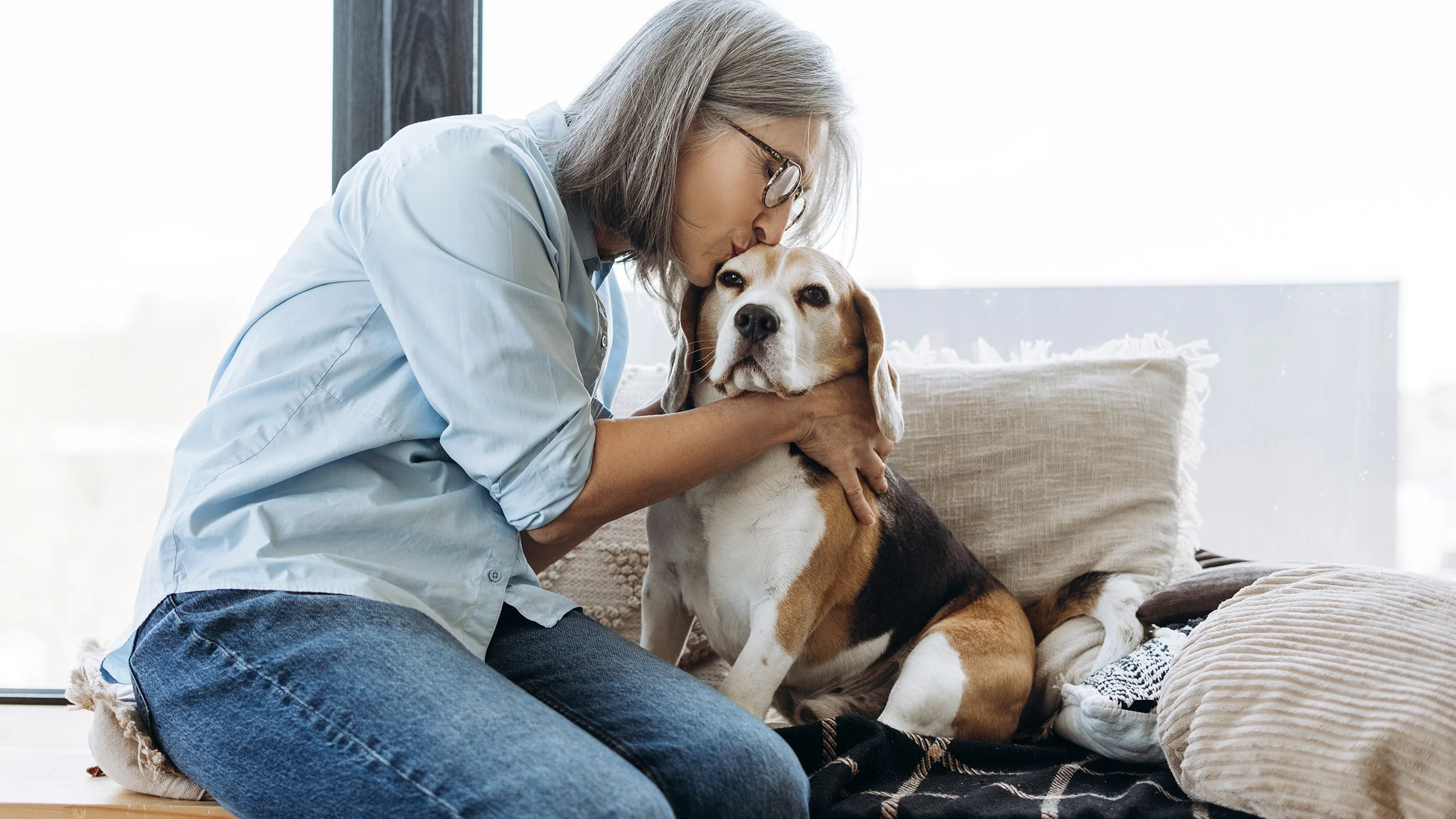Key takeaways:
Two antiaging medications for dogs, rapamycin and LOY-002, are being tested in clinical trials.
Loyal, a veterinary medicine startup, developed LOY-002 as an antiaging medication for dogs. The company is seeking FDA approval for LOY-002.
Rapamycin is a human medication that’s used to limit organ rejection in transplants. Researchers are studying rapamycin’s effects on heart health, mobility, and lifespan in dogs over age 7.
Imagine a life in which your dog lives a longer, healthier life. Two antiaging medications, rapamycin and LOY-002, may make it possible. Researchers are conducting clinical trials on dogs using these medications.
Rapamycin is already available as a human medication. Veterinarians can prescribe it off-label. LOY-002 may get conditional approval from the FDA in 2026. Here’s what you need to know about antiaging medications for dogs.
What are antiaging drugs for dogs?
Antiaging drugs for dogs are medications that could help them live longer, healthier lives. Two medications are being tested in clinical trials: LOY-002 and rapamycin.
Search and compare options
LOY-002
LOY-002 is the name of a veterinary antiaging medication. Loyal, a startup that makes antiaging medications for dogs, developed LOY-002. Its clinical trial is expected to be completed in 2027. But it could be FDA approved sooner based on early evidence that it’s safe and effective for dogs.
Rapamycin
Rapamycin is a human medication. It’s used to treat certain cancers, rare lung diseases, and rare genetic disorders in people. It is also used to limit organ rejection in people who receive a transplant.
The Dog Aging Project (DAP), a collaboration of veterinary researchers, is studying rapamycin as an antiaging medication for dogs.
Why are veterinarians developing antiaging drugs for dogs?
Veterinarians are developing antiaging medications for a couple of reasons. The first is to improve the health of aging dogs. These medications may prevent diseases in dogs that are associated with aging, like diabetes and arthritis. Good health means a better quality of life for an old pup. It can also lead to a longer, happier life.
Veterinary researchers also hope their studies shed light on human aging. Canines and humans experience similar diseases in their older years. Studying aging in dogs can give us insights on aging in people.
How do LOY-002 and rapamycin work for dogs?
LOY-002 and rapamycin work in different ways in a dog’s body.
Dog dementia: Like people, dogs can develop a canine form of dementia as they age. Learn how to recognize this condition and how you can help your pup.
Arthritis in dogs: Arthritis is a common condition among older dogs. Check out ways you can make your dog more comfortable and reduce their pain.
Happy aging for dogs: Just because your dog is getting older doesn’t mean they can’t have a great life. This list of tips to support an aging dog may help.
LOY-002
LOY-002 works by targeting age-related metabolic dysfunction in dogs. The metabolism is responsible for processing the energy and nutrients your dog consumes. As dogs get older, their metabolic health declines. This can lead to diseases and a lower quality of life. LOY-002 aims to address these metabolic issues. By doing so, the medication may be able to improve an older dog’s health and lifespan.
Rapamycin
Rapamycin works in a couple of ways in a dog’s body. First, it suppresses or slows the immune system, making it more efficient at fighting disease. Second, it helps the body use cell energy better. Basically, cells go into energy-saving mode. This may improve the health and efficiency of cells.
Researchers are testing rapamycin to see if the medications improve a dog’s:
Heart health
Mobility
Lifespan
Will antiaging drugs for dogs really work?
It’s not clear yet. Keep in mind, these medications affect only a dog’s metabolic health. This may help prevent the development of certain diseases that lead to death. But it’s too early to know whether these medications will make a difference for dogs.
We also don’t know if antiaging drugs can prevent cancer. Cancer is the most common cause of death in dogs, often when they’re around 10 years old. Some research suggests that rapamycin can help prevent cancer in dogs. But it’s too early to know for sure.
In addition, if these antiaging drugs work, they may extend your dog’s life by 1 to 3 years. Of course, dog owners want as much time as possible with their beloved pet. But it’s important to see what these antiaging drugs can and can’t do. That will take time.
Are antiaging medications for dogs approved by the FDA?
No, the FDA has not approved antiaging medications for dogs. LOY-002 has received the FDA’s “reasonable expectation of effectiveness” rating. This puts it one step closer to FDA approval. The medication first must meet certain safety and manufacturing requirements.
Veterinarians can prescribe rapamycin off-label for use in dogs. Off-label means using a medication in a way that’s not approved by the FDA. This is a common practice in veterinary medicine.
Can you enroll your dog in studies for antiaging pills?
You can apply for the study on rapamycin. Visit the Dog Aging Project website to learn more. Dogs must be 7 or older, 44 lbs to 120 lbs, and spayed or neutered. They must also be in good health for their age.
Loyal’s study on LOY-002 is full, with 1,300 dog participants across the country. You can sign up for their newsletter for updates and to learn about future studies.
When will antiaging drugs for dogs be available?
Loyal expects to receive conditional FDA approval for LOY-002 in 2026. With conditional approval, Loyal will be able to market and sell the medication as they continue clinical trials.
There’s no target date for rapamycin to receive FDA approval. Rapamycin is already available for off-label use in dogs.
Veterinarians may not want to prescribe rapamycin for antiaging until there’s data that it works for dogs. All medications have side effects, so you want to make sure the benefits of a medication outweigh the risks.
How much will the dog antiaging pill cost?
LOY-002 may sell for under $100 a month. A prescription for 30 tablets of rapamycin can run from $40 to $245.
Frequently asked questions
No, you should not give your dog rapamycin without talking to your veterinarian. We don’t know if the medication is safe and works to help dogs. So it’s best not to give your dog this medication without asking your vet about the risks and benefits.
There are several things you can give your aging dog:
Feed them nutritious meals.
Give them joint pain medication as needed.
Provide a comfortable place for them to rest.
Keep up with their flea, tick, and heartworm regimen.
Take your dog to a veterinarian twice a year.
Maintain a healthy weight in your dog.
Go for shorter walks.
Interact with your dog daily to keep their minds sharp.
The FDA is in the process of approving LOY-002, an antiaging pill for dogs. Loyal, the company that manufactures LOY-002, expects conditional FDA approval in 2026. That means Loyal will be able to market and sell the medication while they continue to study it in clinical trials.
No, you should not give your dog rapamycin without talking to your veterinarian. We don’t know if the medication is safe and works to help dogs. So it’s best not to give your dog this medication without asking your vet about the risks and benefits.
There are several things you can give your aging dog:
Feed them nutritious meals.
Give them joint pain medication as needed.
Provide a comfortable place for them to rest.
Keep up with their flea, tick, and heartworm regimen.
Take your dog to a veterinarian twice a year.
Maintain a healthy weight in your dog.
Go for shorter walks.
Interact with your dog daily to keep their minds sharp.
The FDA is in the process of approving LOY-002, an antiaging pill for dogs. Loyal, the company that manufactures LOY-002, expects conditional FDA approval in 2026. That means Loyal will be able to market and sell the medication while they continue to study it in clinical trials.
The bottom line
Two medications, LOY-002 and rapamycin, are being studied as antiaging drugs for dogs. LOY-002 is a veterinary medicine that targets metabolism problems in older dogs. It may become available in 2026 under conditional approval from the FDA.
Rapamycin, a human medication, may strengthen a dog’s immune system and promote better cell energy. It is already available and can be prescribed off-label by a veterinarian if there’s evidence that it works. Both medications may improve a dog’s overall health, quality of life, and lifespan.

Why trust our experts?



References
Allen, A. J. (2024). Introduction to metabolic disorders of dogs. Merck Veterinary Manual.
American Veterinary Medical Association. (n.d.). Caring for senior cats and dogs.
Crossley, K. C. (2025). Second drug for canine healthy lifespan extension receives FDA support. DVM360.
Fleming, J. M., et al. (2011). Mortality in North American dogs from 1984 to 2004: An investigation into age-, size-, and breed-related causes of death. Journal of Veterinary Internal Medicine.
Hill, A. (2024). Scientists explore longevity drugs for dogs that could also ‘extend human life.’ The Guardian.
Jing, L., et al. (2014). Rapamycin: One drug, many effects. Cell Metabolism.
Larkin, M. (2011). Study examines causes of death in dogs. American Veterinary Medical Association.
Loyal. (n.d.). Product brief for veterinarians.
McKenzie, B. (2025). What Loyal’s LOY-002 RXE milestone means: A practicing vet’s perspective.
MedPath. (2025). Loyal’s LOY-002 receives FDA’s RXE acceptance for canine lifespan extension.
Paoloni, M. C., et al. (2010). Rapamycin pharmacokinetic and pharmacodynamic relationships in osteosarcoma: A comparative oncology study in dogs. PLoS One.
U.S. Food and Drug Administration. (2020). Conditional approval explained: A resource for veterinarians.
Won, C. (2025). $7M grant rescues dog study investigating rapamycin for canine aging. American Veterinary Medical Association.














